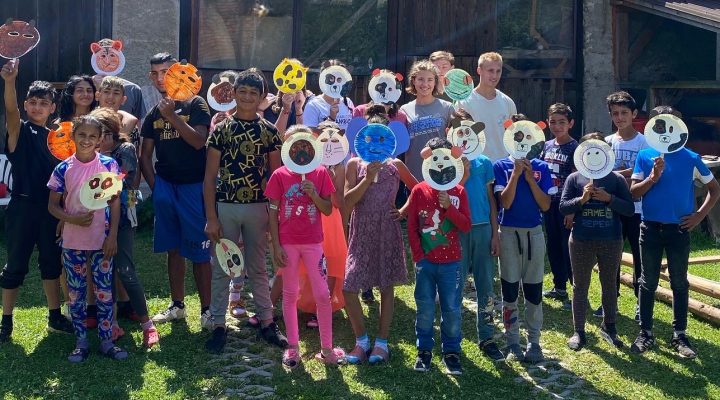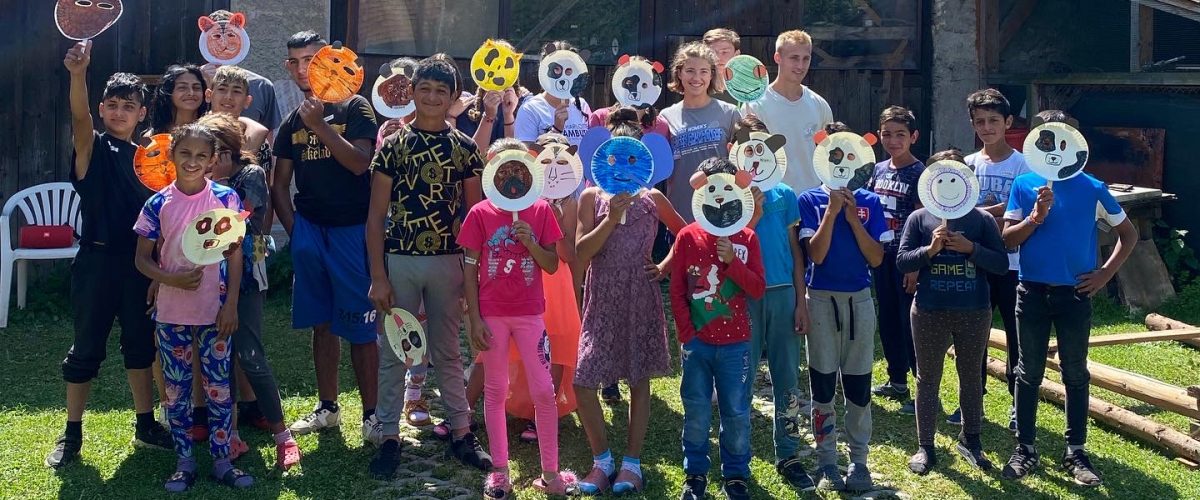This summer, a team of nine high school students and four adults from Providence Baptist Church in Charlotte, N.C., traveled on a mission trip to Važec, Slovakia.
Ours was the last missions team hosted in Slovakia by former CBF Field Personnel Dianne and Shane McNary, whose 19-year career as ministers to the Roma people across Slovakia and Czechia ended days after our team returned to the States.
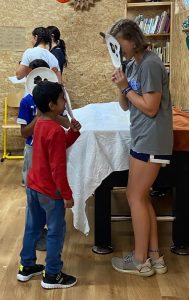 Our team served children in the town’s Roma community, hosting Backyard Bible Camp every morning, and teaching English lessons in the afternoon. As the summer youth ministry intern at Providence, I acted as one of the four adult leaders, although most of the work was spearheaded by our students.
Our team served children in the town’s Roma community, hosting Backyard Bible Camp every morning, and teaching English lessons in the afternoon. As the summer youth ministry intern at Providence, I acted as one of the four adult leaders, although most of the work was spearheaded by our students.
Each night before camp, our team met in a common area of the house we were staying in to discuss the day’s highs, lows and “God-moments,” then used our reflections to create a plan for the next day. With a team of students so eager to get to work, the adult leaders functioned less as instructors and more as sources of support and assistance.
Each evening, students eagerly volunteered to lead story time, recreation, music, arts and crafts, and snack time. In fact, they spent a great deal of time prior to our arrival in Slovakia planning the themes for our Bible and English camps, even taking the time to come up with creative snacks thematic to each day’s lessons.
Service from the perspective of a learner
This model of student-led mission work allowed our youth to engage in the work they set out to do from the perspective of a learner. They were learning how to complete the goals of our mission work in the best way possible, problem-solving each day to make the next one better, while also learning about and interacting with a community of God’s people new to them.
When our team first arrived in Važec, Dianne and Shane sat down with us to discuss some housekeeping rules, like who would clean up after breakfast (which was my job). But they did not let us get to work without first giving us a briefing on who it was we were working with.
The McNarys went over important Slovak vocabulary and phrases we needed to know, such as how to say, “Ahoj” (hello/goodbye), “Ako sa voláš” (What is your name?) or “Ďakujem” (Thank you). They also taught us which English words to avoid saying, due to their phonetic similarities to offensive Slovak words.
The next day, Shane took our team on a walking tour through the town, describing the Roma community’s history and culture, and educating us about systematic issues the Roma face. In preparation for our work with children, much of this discussion focused on what home life looks like, levels of poverty, the discrimination Roma children face in the education system, and how these factors of life impact Roma community members long-term.
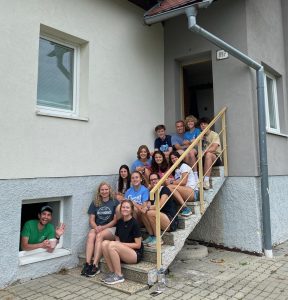 This education set the stage for our students as they engaged in service with a heart posture that prioritized learning. Their work not only was allowing them to teach the Roma children Bible stories, or help with English literacy, but was formation in their own growing understandings of what it means to be global citizens through the lens of their faith in God.
This education set the stage for our students as they engaged in service with a heart posture that prioritized learning. Their work not only was allowing them to teach the Roma children Bible stories, or help with English literacy, but was formation in their own growing understandings of what it means to be global citizens through the lens of their faith in God.
Dianne said for young people, participating in a service like this, takes what we learn about missions in church from theoretical to experiential.
“In many churches, our children and adults learn about missions in different locations and the field personnel serving there but it doesn’t seem real,” she said. “Allowing youth/young people to experience missions in person makes them a witness to the ministry and brings it to life. Those who participate actively in missions are our best ambassadors to churches. Their experience also prepares them to be supporters of missions as they grow older.”
‘Jesus done been here’
Shane, during our walking tour, pointed out churches in the area as he described the deep religious history of the Roma people. “Jesus done been here,” he retorted as he taught us about the many ways in which the Roma community has been in a relationship with God far before American Christianity existed.
Our team did not travel to Slovakia so we could be religious saviors to people estranged from God. Although we spent a great deal of time talking about and teaching the love of Jesus, this was not completely new to them. They were beloved by God before we arrived and still are after we have gone. And many of them were well-versed in the Scriptures.
The purpose of our mission was not evangelical.
Instead, our purpose was to share love across God’s diverse and immense kingdom, being spiritual lovers of those who are spiritual lovers of us, finding community in fellowship as we all are beloved by God. As we engage in this loving relationship between God, ourselves and others, we grow into a heart posture that welcomes learning, growth and faith formation.
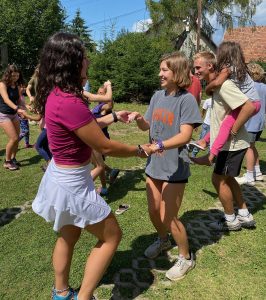 Had we overlooked the opportunity to learn about the rich history, culture and community we were entering, this mutual exchange of love never would have been possible, and our mission would have been serving the needs only we believed were important, using solutions only we believed were efficient.
Had we overlooked the opportunity to learn about the rich history, culture and community we were entering, this mutual exchange of love never would have been possible, and our mission would have been serving the needs only we believed were important, using solutions only we believed were efficient.
Getting to know the people and place was better for us and for the children we were about to serve.
Dane Jackson, Providence Baptist’s minister to youth and their families, and also my supervisor for the summer, explained to me during a conversation how this work was formational for high school students because, as they engage in their mission, love others and invest themselves deeply in the community they serve, they learn “who the person of Jesus is in the context of where (they) are.”
As youth are discerning their identity, belonging and purpose, mission trips like this one are helpful because they provide a new outlook into who God is, how God functions within the world around them and what this has to do with their own selves.
But what about …
But in a time where the media is full of commentary on what Christianity is supposed to look like, mission work doesn’t always get the best rep.
In fact, when you Google, “why mission work is bad” there are 1.37 trillion results making cases for the harmful impacts of mission work. And many of the issues raised in these pieces are relevant. They make points like:
- Sending out teams is expensive, even for a short amount of time. Why spend so much money paying for your team to travel when your church could just send money directly to the community experiencing poverty?
- Not all missionary teams are qualified to be doing the work they set out to do, but there are local community members who could be doing this work. Why send out people to do projects when locals who need the money could be paid to do the work?
- Many missionary teams only stay for a short amount of time, which can sometimes do more harm than good. Why send out short-term relief if it won’t offer a long-term solution?
- Many who engage in short-term volunteerism use the experience to tout their white Christianity on social media. Why send out missionary teams when it seems like the only result is white saviorism?
Why, in a time like this when all these issues about mission work have been exposed, can the church justify sending out a mission team? And of all people, why send our youth?
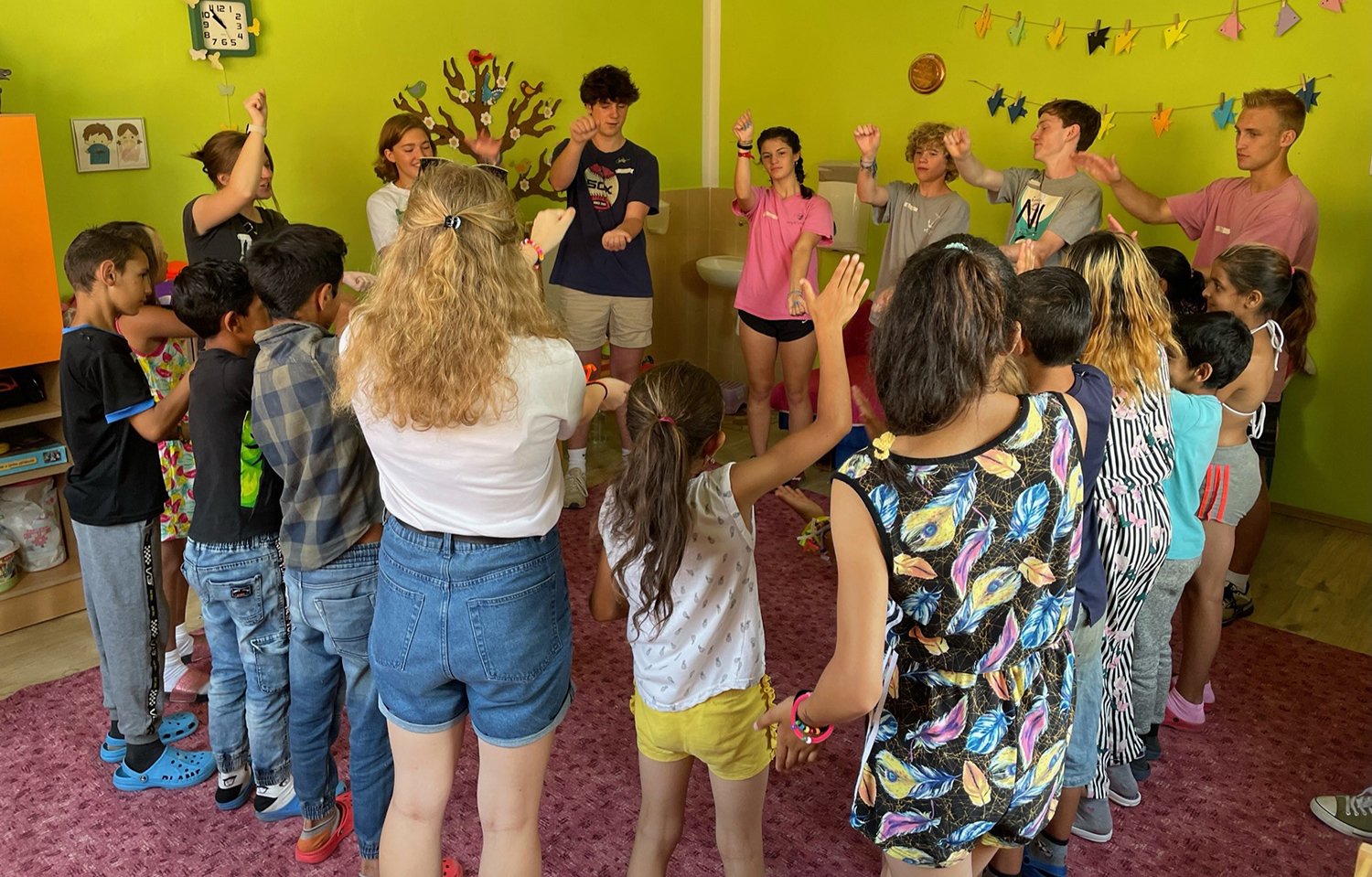
Understanding the cause
Essential to our service was the 19-year-long relationship Dianne and Shane McNary had with the community in Važec, Slovakia. Providence was one of the couple’s Encourager Churches.
Although our team was working in Važec for only a week, we were part of a long series of mission teams who have been hosted by the McNarys over the course of their time as field personnel. We were only there for a short time, yet the work we were doing contributed to years of work the McNarys had developed while in a deep relationship with this community.
And these relationships between CBF and the Roma communities in Slovakia and Czechia were not flaunted or heavily displayed, either. Shane explained that although this work was funded by CBF, it never was about advertising. It was about building relationships.
“We never asked any of our partner organizations to put signs up identifying Cooperative Baptist Fellowship as benefactors for their ministries or organizations. We did not leave a visible mark, even after 19 years. However, we have hundreds of friends from within and from outside the church whose lives have been changed.”
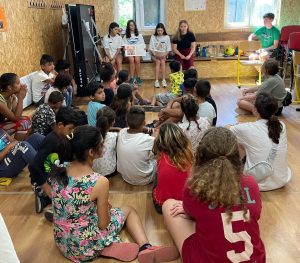 While there are no branded markers signifying all their work, the couple’s efforts live in the relationships and memories they carry with them, he said.
While there are no branded markers signifying all their work, the couple’s efforts live in the relationships and memories they carry with them, he said.
“We were present for dozens of baptismal services of Roma whose decisions to follow Jesus can be traced to a camp we sponsored, an outreach we facilitated with the assistance of short-term teams. We know there are many Roma who received scholarships, completed their education and are now employed. We have friends who continue to reach out to us on social media to ask for prayer as they share their ongoing triumphs and setbacks as they walk with Jesus. We give thanks for a long-term mentoring relationship with a Roma young man through very painful spiritual setbacks. He would not have stayed in ministry; but is now pastor of a new church plant.”
To help our team be part of this work, Dianne and Shane communicated with us the specific needs of the community they expected us to meet during our trip. As we gathered materials and made plans, they helped us create a schedule that would have a positive impact on the community.
Most importantly, they taught us about the impact of our presence. How to complete this work so the community would thrive after we were gone, not be depleted or depressed when we left.
“Our youth knew their week in Važec was just one piece of the puzzle.”
Because of this, our youth knew their week in Važec was just one piece of the puzzle Dianne and Shane had been putting together for nearly two decades. It was not about what they could do for the community, but how they could serve to help the community flourish a little bit better, and what they could learn along the way.
Learning history and culture
And because the goal of our mission was to conduct service-based learning, our youth took away personal lessons from their experience about Roma and Slovak culture, history and community life. This helped foster within them a deeper understanding of how God is constantly interacting with all creation and how they can be responsible, faith-informed global citizens.
I watched this faith formation happening throughout the week as our youth made sincere efforts to learn Slovak, so they might communicate with the children a little bit better. And even when they could not figure out how to communicate, they learned to take advantage of the ministry of presence, one hug, giggle or performance of the silly “Cotton-Eyed-Joe” line dance at a time.
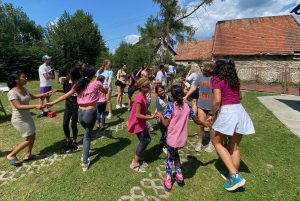 They also learned about empathy and cultural awareness on a much deeper level than they had understood before. This immersive experience led them to a place of reflection.
They also learned about empathy and cultural awareness on a much deeper level than they had understood before. This immersive experience led them to a place of reflection.
Our youth walked the children back to their homes each day, hugging them goodbye and sometimes meeting their families, reflecting on how the great breadth and joy of God’s love was so big it could exist in the same spaces in which these families faced systematic struggles every day.
A love so big, in fact, these children not only needed to receive love from our youth but also took every opportunity to give love back to them.
On why young people should engage in mission work, Shane said, “We are glad that during our time as CBF field personnel, we could help facilitate the introduction to a lifetime of service to hundreds of youth who came to Slovakia or Czechia. In addition to the focus on providing a meaningful, learning engagement for the youth from the United States, we also tried to leverage the presence of short-term ministry teams to have maximum impact for and with our local partners.”
And although these teams were only doing missions short-term, he was able to witness the long-term impacts this work had over time.
“The interaction of youth from the United States with Roma youth from Slovakia and Czechia has had a profound impact on the lives of the Roma,” he said. “We had the joy of having a long-term presence with these youth and could see the changes in their social and spiritual growth as a direct result of the short-term teams, more specifically interaction with youth, from the U.S.”
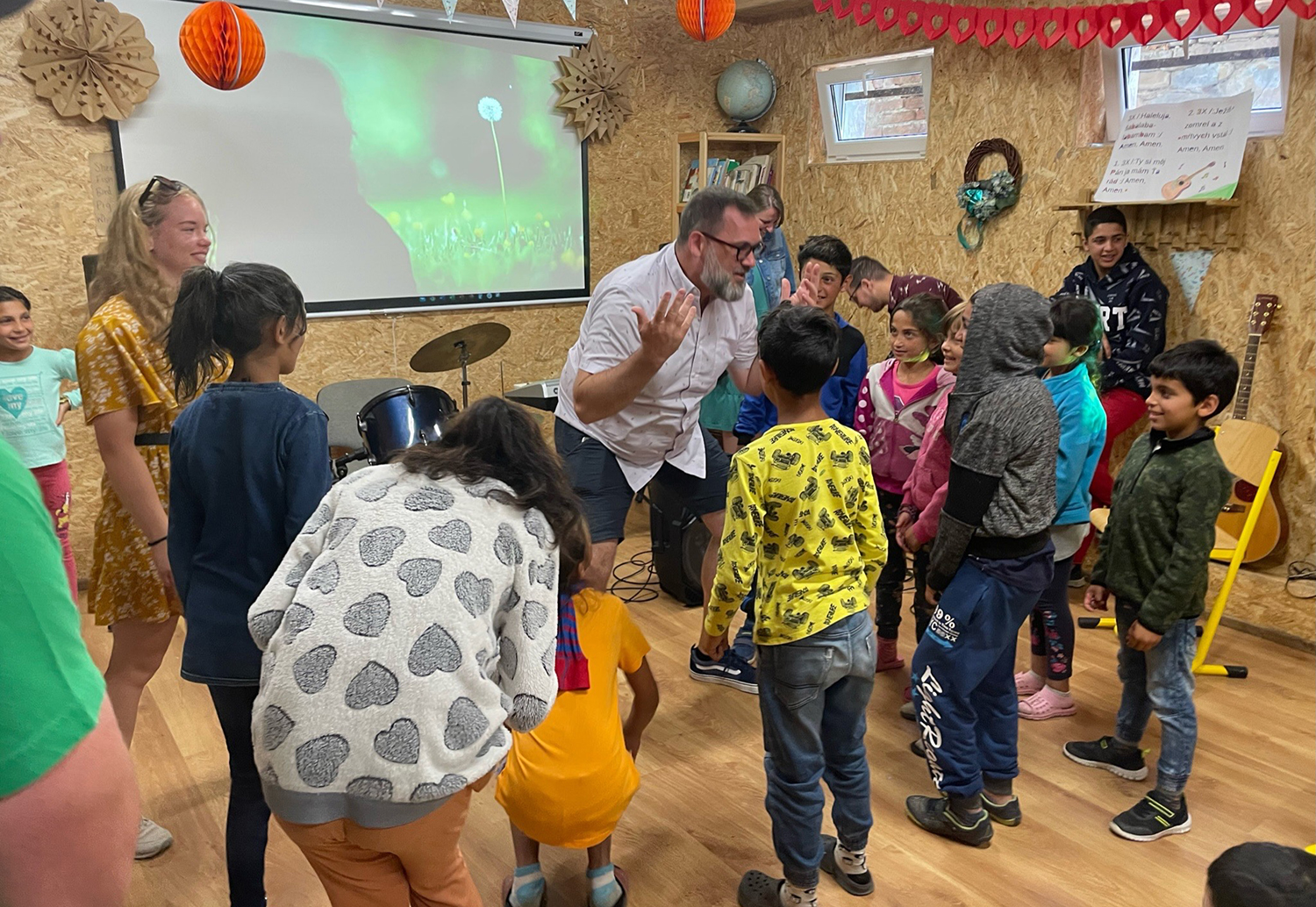
Coming back home
Our team came home after only a week of service to the Roma community in Važec. We made this transition first by traveling to Poland, where we toured Auschwitz-Birkenau to deepen our understanding of the historical violence and injustice faced by the Roma and others.
Then after we were back in the States, our team debriefed together about the experience. We talked about what our expectations were for the trip, what felt important to us, and how to carry this with us as we continue growing in our relationships with God, ourselves and the world.
Dianne and Shane’s transition back to the United States was a little bit different.
Sure, our students and chaperones made connections over the week, but the McNarys were transitioning out of a 19-year-long call to service. Among this big (and certainly emotional) change, I asked the couple what they hoped might be a lasting impact of the work they did.
Dianne, who is now CBF’s Offering for Global Mission Advocate, offered these words of reflection: “As I transition to a new role with CBF, I hope I have left a legacy of building relationships, of acceptance and inviting everyone to the table to participate. Of looking beyond the outward appearance and getting to know the person inside.”
Shane further explained, “We leave behind Roma friends who live in segregated or isolated communities who know that somewhere in the United States there are Christians who know them by name and pray for them. We know there are two community centers, two church plants, English books in school libraries and classrooms, and memories too numerous to count in Slovakia and Czechia today as a result of our ministry there.”
He concluded, “We left, as they say, everything on the field and, by God’s grace, there is still evidence of God’s mercy and grace that resonates through the lives of Roma.”
Mallory Challis is a master of divinity student at Wake Forest University School of Divinity. She is a former BNG Clemons Fellow.

